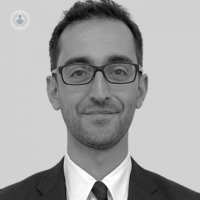A quick guide to ACL reconstruction
Written in association with:Esteemed consultant orthopaedic surgeon Mr Shibby Robati discusses everything you need to know about ACL reconstruction, including the best graft options, how you can improve your chances of a successful ACL reconstruction and how the procedure works in his practice.

Do I need ACL reconstruction surgery for my torn ACL?
Whether you need surgery for your torn ACL depends on several factors, including your age, activity level, the sports you participate in, and the stability of your knee. Generally, we prefer that patients first undergo a course of physiotherapy. If physiotherapy does not improve your condition, then we consider proceeding with surgery.
What type of graft is best for ACL reconstruction?
There are several graft options available for ACL reconstruction, including hamstring grafts, patellar tendon grafts, and quadriceps grafts. Personally, I prefer using a hamstring graft for primary cases and reserve quadriceps grafts for revisions or redo surgeries. Occasionally, patients have specific preferences, and I am always willing to discuss the pros and cons of each graft type with them.
How long is the recovery time after ACL reconstruction?
ACL reconstruction can be quite painful, so in my practice, I use keyhole techniques to help you return home the same day. I expect your wound to be fully healed in about two weeks, at which point you can begin your physiotherapy regimen diligently. By three months, you should be able to start running on the spot.
At six months, you can begin running, twisting, and participating in non-contact sports like tennis. By nine months, I anticipate you will be ready to resume contact sports such as football and rugby.
What are the risks of ACL reconstruction surgery?
Like any surgery, ACL reconstruction carries some risks, although they are generally small. One of the primary concerns is the potential for the graft to rupture. Fortunately, there are several measures you can take to minimise this risk. Other possible complications include stiffness, a patch of numbness near the scar, and blood clots. We implement various precautions to reduce the likelihood of these issues.
What can I do to improve my chances of a successful ACL reconstruction?
To maximise the success of your ACL reconstruction, it's crucial to adhere strictly to your physiotherapy protocol. Think of your exercises as a daily routine, much like brushing your teeth. Avoid returning to your usual sports activities too soon, as this significantly increases the risk of graft rupture.
Additionally, if you smoke, reducing or quitting altogether can greatly enhance your healing process. Finally, you should use common sense and avoid activities that could jeopardise your recovery.
If you require ACL reconstruction and would like to book a consultation with Mr Robati, do not hesitate to do so by visiting his Top Doctors profile today.


